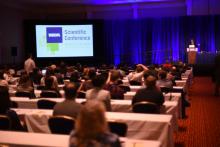Thursday morning focused on understanding the genetics and the “epigenetics” of neuromuscular disorders
Epigenetics is the relatively new field of factors that influence the activity of genes but do not change the basic coding (DNA sequence) of a gene. Identifying the genetic and epigenetic pathways of a disease can allow for better diagnosis and genetic counseling for families, as well as identify potential targets for therapeutic development.
 Some highlights:
Some highlights:
- Congenital muscle diseases: Carsten Bonnemann from the National Institutes of Health talked about how “next-generation” genetic sequencing has revealed many new genetic causes of congenital muscle diseases and shown how disorders that may look the same actually have completely different molecular roots, while disorders that may look very different sometimes have the same molecular roots.
- Limb-girdle muscular dystrophy (LGMD): Monkol Lek from Massachusetts General Hospital described how new technologies can be used to identify genetic flaws that are otherwise impossible to find, such as those that occur in areas of a gene that do not code for a protein. “Whole-genome sequencing” and “RNA sequencing” are two such technologies. In fact, in a surprising revelation, Lek told the audience that his own disorder – type 2G limb-girdle muscular dystrophy (LGMD2G) – was recently diagnosed using new technology. Although he had experienced some muscle weakness starting at age 19, he didn’t have a precise diagnosis until the age of 32. (Lek’s disorder has caused some difficulty with walking but has not interfered with his career as a molecular biologist.)
- Friedreich’s ataxia (FA): Sanjay Bidichandani from the University of Oklahoma gave a particularly exciting presentation about the therapeutic implications of the epigenetics of Friedreich’s ataxia. It’s been known since the 1990s that the disease is caused by an abnormal expansion of DNA in the gene for a protein calledfrataxin. But more recently, it’s been found that this underlying DNA expansion results in an epigenetic change that leads to “silencing” of the frataxin gene. The good news is that this silencing appears to be reversible by treating cells with a type of compound known as an “HDAC inhibitor.” Making sure an HDAC inhibitor does what you want it to do and only what you want it to do will be challenging, but the finding is an extremely promising lead.
Several presentations related to the genetics and epigenetics of amyotrophic lateral sclerosis (ALS):
- Muralidhar Hegde from the Houston Methodist Research Institute showed data suggesting that mutations in the TDP43gene and the FUS gene — both of which can cause ALS — interfere with the ability of cells to repair damage to their DNA. The findings present some possible new targets at which to aim therapies.
- Heather Durham from McGill University discussed experiments from her group showing that epigenetic changes in motor neurons (muscle-controlling nerve cells) taken from ALS patients cause important parts of these cells to degenerate before the cell actually dies. The parts, known as “dendrites,” are responsible for receiving signals from neighboring cells. Treating motor neurons carrying an ALS-causing mutation in the FUS gene with an HDAC inhibitor preserved the dendrites, suggesting a possible pathway for therapeutic development.
- Bryan Traynor from the National Institutes of Health described his group’s identification a few years ago of an ALS-causing expansion in the C9ORF72 gene as an “extraordinary moment in time” that he hopes other researchers will experience in their careers. This expansion mutation underlies about 40 percent of ALS cases in which there is a family history (“familial” ALS) and, surprisingly, about 8 percent of those in which there is no known family history (“sporadic” ALS). Understanding the changes brought about by the C9 gene mutation is likely to open up new opportunities for drug development.
Roxan Olivas
MDA Vice President — Public Relations & Community Programs
(520) 529-5317
rolivas@mdausa.org
